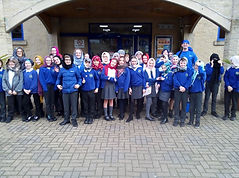A loving, family school, respecting and caring for our world and everyone in it.
Religious Education

Our RE Curriculum
Our local and school community does not enjoy a rich diversity of faiths, so it is vitally important that we offer our children opportunities to wonder about, question and explore a range of faiths in a positive and curious way.
We do this by gradually introducing our children to the beliefs and practices of Christianity, Islam and Non-Religious World Views in KS1 before looking at these alongside Judaism and Sikhism in KS2 in readiness for Buddhism and Hinduism at KS3.
The RE curriculum is designed around six learning pathways. These have been developed from ‘Big Ideas’ and act as the framework for sequencing learning in religion and worldviews at all key stages from age 5 to 18. While organising the curriculum along these pathways, our children concurrently develop substantive knowledge of specific religions/worldviews.
As a result, our RE curriculum will:
- achieve a broad, but rigorous, understanding of religions/worldviews in the context of our local communities and our country;
- provide for deeper focused study of specific topics and questions.
RE is a compulsory subject. Schools have to teach RE but parents can withdraw their children for all or part of the lessons. Pupils can choose to withdraw themselves once they’re 18.
Local councils are responsible for deciding the RE syllabus, but faith schools and academies can set their own.

Our Year 1 children visiting a mosque in Leeds

Year 3 children retelling a Bible story
RE Intent, Implementation & Impact

A faith visitor in Year 1 talking about their values & beliefs

Year 6 trip to The Sikh Temple

Y5 lesson on ‘Codes for Living’

Y3 reflecting on what 'light' means to people
RE Learning Websites
What our pupils are saying:






Our faith visitor helping Y2 children to understand their beliefs
A visit to Otley Parish Church

Year 6 exploring a visual artistic representation of the Bible in the Understanding Christianity unit

Y4 reflecting on the importance of the global goals and writing 'statements of belief'

Y2 learning about how new life is welcomed
